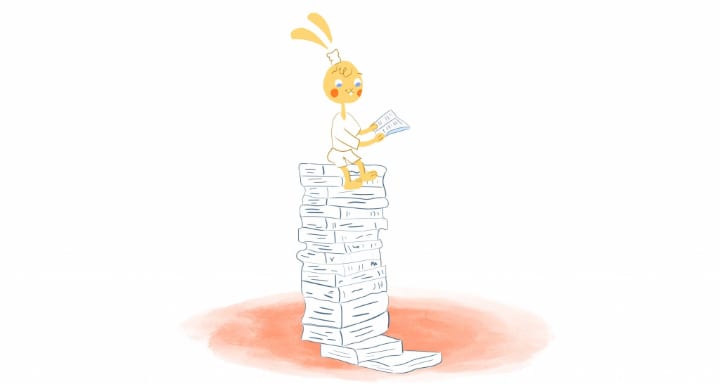

How did you spend your recent vacation? Did you soak up the sun at the beach or go hiking in the mountains? Maybe you backpacked through Europe, took a family road trip, or simply had a relaxing staycation.
Everything seems to be going well until you realize what awaits you on the last day of vacation. And it starts with a capital W.
No. Your mind isn’t playing tricks on you. We all hate going back to work after vacation. In fact, it’s a phenomenon that’s been studied numerous times. For example, a Zapier / Harris Poll found that 87% of knowledge workers dread returning to the office after vacation.
But why?
The following tasks are among the most dreaded:
- Reestablishing a routine – 37 percent
- Getting caught up with administrative tasks – 31 percent
- Feeling overwhelmed by busy work – 27 percent
- Post-vacation blues – 27 percent
- Dealing with piles of unread emails/messages – 26 percent
- Being overwhelmed by a busy schedule – 25 percent
- Not being in the loop about tasks – 23 percent
- Catching up on missed work while feeling unproductive – 20 percent
- Missing an important decision made while they were away – 18 percent
- A delay in a project caused by their absence – 18 percent
- Having trouble managing their projects – 17 percent
Psychologist Jeroen Nawijn, who has studied how vacations affect the quality of life, tells Popular Science that people generally feel rejuvenated after a vacation. However, these benefits tend to disappear after they return home. “They most likely feel best during vacation because they have more freedom to do what they want,” he explains.
Suzanne Degges-White, a therapist at Northern Illinois University and chair of the department of counseling and higher education agrees. “Once we get back into the work world, the majority of us have to answer to someone about what we’re doing, how we’re doing it, and when we’ll be done,” she says.
In addition, she says that going on vacation doesn’t alleviate all of our responsibilities and quandaries. “Many people dread the return as they know that problems may have stacked up in their absence. There may be a pile of new requests of their time on top of the unfinished tasks they left behind,” Degges-White explains.
Additionally, she points out the impact of switching from a more flexible sleep schedule on vacation to a more rigid and regimented bedtime schedule during the week. Moreover, overeating (and drinking, if that is your thing) can lead to sluggishness. And it can also negatively impact wellbeing.
At the same time, you don’t have to let the good times go after the vacation has ended.
1. Plan before you go.
Before leaving for vacation, prepare for returning to work.
As soon as you begin planning your vacation, you should consider what potential problems or events could distract you. Also, don’t wait until the last minute to start any big projects. Be sure to complete any urgent tasks before you depart if there are any deadlines during your absence.
If you’re going away, plan ahead and get your team to assist you while you’re away. I’d also suggest that you reciprocate while they are away.
Some other tips include:
- Tackle your priorities ASAP. “How you identify your priorities is totally up to you,” writes Max Palmer in a previous Calendar article. “I would recommend reviewing your calendar and then composing a master list.” If you have an appointment scheduled already, consider rescheduling it. Also, the 80/20 rule or 1-3-5 scheduling rule can help you trim back your list. Keep all of your appointments so you can clear them off your schedule.
- Don’t burn yourself out before your vacation. There’s nothing frontloading what you can. “But, you still need to take breaks to rest and recharge,” he advises. “If I know I have an upcoming vacation, I might put in a couple more hours of work each day.”
- Clean your plate, don’t add more. In Max’s case, this means not taking on any new assignments until he gets back home. “I also cut back on the number of meetings I accept so that I can focus mainly on my work.”
One final suggestion. Don’t forget to schedule your vacation days.
Let clients and coworkers know you’ll be away. If you’re on vacation, they should be respectful of your absence. It is unlikely that you will be bothered by people if they know you are on vacation — especially if you have given them several weeks’ notice.
2. Don’t disappear completely.
It may make more sense to be “largely” disconnected — even if the original idea is to completely disconnect.
That doesn’t mean you should scrap out-of-office messages altogether. Still, you might want to check your email periodically. In this way, you can stay up to date on what’s happening in the office. And this also prevents your inbox from getting too cluttered.
Additionally, some messages may require your response. For example, as a freelancer, you may want to reply to potential clients about how long you are away. If you are available, let them know. Or, perhaps you can refer them to someone who can help.
3. Schedule a buffer day.
Whenever you are considering how many leave days to take off, consider a buffer day or two as well. It’s these days that give you a chance to reorient yourself at home after your vacation. For example, when you get home, you can unpack, do laundry, bond with your pets, and go shopping for essentials.
In short, having a buffer day gives you time to unpack your bags, do your laundry, go grocery shopping, and prep your meals for the week instead of doing so after work.
4. Check your calendar.
Make sure you check your calendar the day before you return to work so you are not surprised by unforeseen meetings or tasks. If you do encounter unexpected surprises, consider whether you can handle them without too much preparation.
And, if possible, postpone them until you can contribute meaningfully.
5. Stay in stealth mode.
Your boss, colleagues, clients, and immediate reports may be aware that you’ve returned. In any case, there is no harm in waiting a couple of days before broadcasting your return to the real world.
Why? With selective stealth, you can catch up and return to normal life without being rushed or distracted.
6. Divide your first day back into time blocks.
Break up your first day back at work after vacation into blocks of time. And, don’t forget to take regular breaks. One rule of thumb is the 52/17 Rule. Here you would work for 52-minutes and then take 17-minutes.
On your first day back at work, do not feel pressured to work hard. Once you’ve returned from vacation, it’s important to give your body and mind some time to adjust. And time blocks can do just that while also helping you focus on your priorities.
7. Get organized.
Getting organized is the first thing you should do when you return to work. For some, this might mean putting yourself in a good physical or mental state. As such, you might want to engage in some physical activity to release endorphins
Keeping your office or workspace tidy is another suggestion. This should also be done before you leave for vacation, so you’ll be able to return to a clean work environment. If not, use your post-vacation to clean and organize this area. Or, use this as an excuse to finally spruce up your workspace.
8. Make work fun.
Use your first week back to accomplish things you actually enjoy. Maybe this could be scheduling lunch with a coworker where you exchange vacation stories. Or, you could embrace gamification in the workplace.
You can also make work by:
- Start the day with a playlist that gets you pumped and motivated.
- Review your past accomplishments and track the progress of your goals.
- Decorate your workspace.
- Put on clothes that will make you happier and more confident at work.
- Bring your dog to work — or let them stay with you in your home office.
- Whenever you complete a task on your to-do list, reward yourself with a healthy snack or victory lap outside.
- Plan an out-of-work activity with coworkers.
9. Don’t go full throttle.
You shouldn’t be too rigid about what you expect for your return to work — whether you plan to take it easy or jump right into the fire. After all, there’s a possibility that your plan for a slow and easy return may turn out to be a lot faster than you expect.
Make time for self-care, pace yourself, and ask for extensions when necessary. You will be less stressed and less overwhelmed if you are kind to yourself during this transition.
10. Take a piece of your vacation with you to work.
When you return to work after vacation, bring a souvenir that is appropriate for the office, such as a coffee mug, mouse pad, pen, desk ornament, or framed picture of your trip. It has been found that recalling vacations and other adventures can provide great pleasure, according to UC Riverside psychology professor Sonja Lyubomirsky’s book, Myths of Happiness.
A souvenir can bring back happy memories that can motivate you through the daily monotony of your work.
Image Credit: Andrea Piacquadio; Pexels; Thank you!











Howie Jones
My name is Howie and I'm a Customer Success Manager at Calendar. I like to ensure our customers get the best experience using our product. If you have questions email me howie at calendar.com